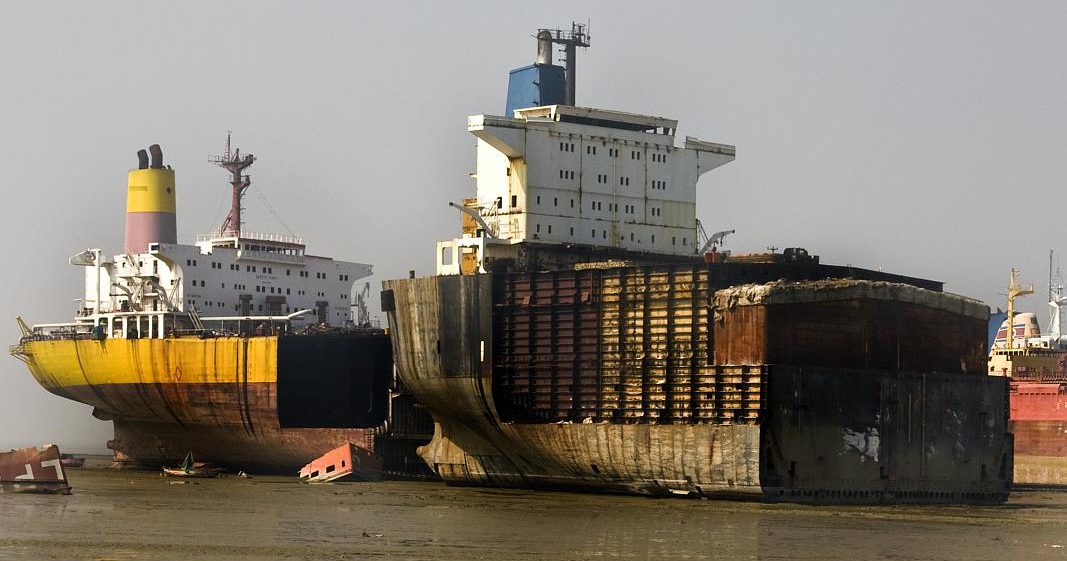Shipbreaking near Chittagong, Bangladesh, image by Naquib Hossain, republished under Creative Commons license
By K. Denise Rucker Krepp
The Maritime Administration hosted a symposium recently in preparation for drafting a new national maritime strategy. Like the first symposium in January 2014, many attendees recommended that the agency support shipbuilding, Title XI financing, the Jones Act, and cargo preference. These vital programs should be supported but the agency should also expand its support to cover ship recycling and the thousands of individuals diligently working in Texas, Louisiana, Mississippi, Alabama and Florida. These individuals have gone unrecognized for too long and their contributions to the maritime community should be acknowledged.
At the beginning – and the end – of the life of a vessel is ship recycling. It is the beginning because the steel and non-ferrous metals are recycled. It is also the end, because unless a vessel sinks – or is sunk – the ship owner sells the raw commodity and ship recyclers take apart the vessel and, at least in the United States, manage the hazardous material waste stream, and reintroduce the metal for reuse.
Section 3502 of the 2009 Duncan Hunter National Defense Authorization Act requires all U.S. government vessels to be scrapped at U.S. metal recycling facilities. Sadly, the law isn’t being followed consistently. Last fall, the General Services Administration allowed the USCG STORIS to be exported from the Suisun Bay fleet to Mexico for scrapping. FOIA’d documents since released, show that despite warnings to the Environmental Protection Agency, General Services Administration (GSA), and the Coast Guard prior to releasing the vessel, no federal agency, including MARAD, was willing to stop its departure. A group of dedicated maritime preservationists tried to work with the Coast Guard and GSA to turn the STORIS into a museum ship, but they weren’t successful.
The Maritime Administration also allows commercial flag ships to leave the U.S. registry to be scrapped abroad. It’s easy. The owner merely submits paperwork to MARAD for processing. The 2010 and 2011 Annual MARAD highlights the significant number of vessels that reflagged simply to be scrapped in India and China. Each time MARAD signed off on the paperwork, people in Louisiana, Texas, and elsewhere lost job opportunities.
Vessels are leaving the U.S. to be scrapped in countries where safety and health conditions continue to deteriorate. According to Environment News Service, four workers died at the Chittagong, Bangladesh facility in April, one of those who died didn’t have safety equipment; others hadn’t received the necessary training to prevent accidents.
The horrific environmental conditions and human rights violations at Bangladeshi ship recycling facilities have been highlighted recently by the National Geographic Society.
Sadly, the husband of Bangladeshi environmental activist Syeda Rizwana Hasan was kidnapped last month because of her work to improve conditions at the Bangladesh ship breaking facilities. Hasan is the Chief Executive of the Bangladesh Environmental Lawyers Association and the recipient of the 2012 Ramon Magsaysay Award for “her uncompromising courage and impassioned leadership in a campaign of judicial activism in Bangladesh that affirms the people’s right to a good environment as nothing less than their right to dignity and life.”
At a Rumi Forum presentation three weeks ago, I asked the Bangladeshi Ambassador to the U.S. what his country was doing to improve conditions at ship breaking facilities. He stated that accidents like the one at Chittagong are to be expected. The Ambassador also rebuffed claims at the presentation that his country’s leaders were committing human right’s violations. He told attendees that recent photos of dead Bangladeshis had been Photoshop’d and everything was okay in the country.
Instead of allowing U.S. vessels to be scrapped abroad in environmentally dangerous situations, the Maritime Administration should be advocating for domestic ship recycling. In this role, the agency should work with U.S. owners to recycle U.S.-owned or flagged commercial vessels in the United States.
MARAD should also work with its sister agencies to make sure that all government vessels are recycled at U.S. facilities and that any barriers to recycling foreign flagged vessels are removed. Recycling vessels in the U.S. creates jobs, enhances the nation’s national security and competitiveness and helps protect the environment, something everyone can endorse.
K. Denise Rucker Krepp is a former Maritime Administration Chief Counsel who currently advocates on behalf of the U.S. domestic ship recycling industry.
Ms. Krepp began her career as an active duty Coast Guard officer. After September 11, 2001, Ms. Krepp helped create the Transportation Security Administration. She also served as Senior Counsel on the House of Representatives Homeland Security Committee. Ms. Krepp is a professor at Pennsylvania State University, a member of the Board of Directors for The Infrastructure Security Partnership, and a commentator on Backroom Politics, a weekly radio show.

 Join The Club
Join The Club











